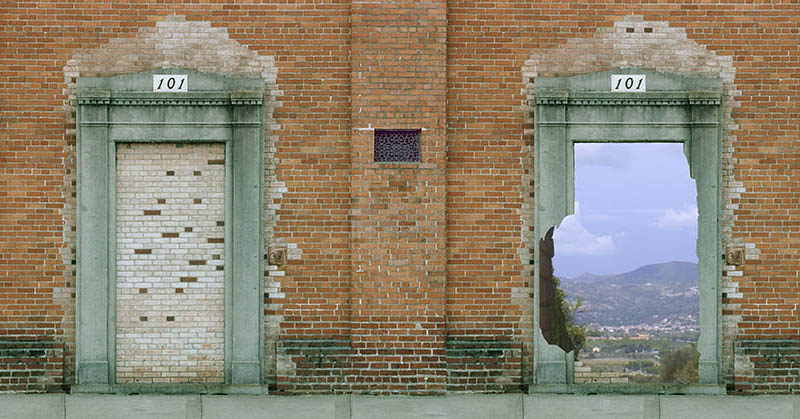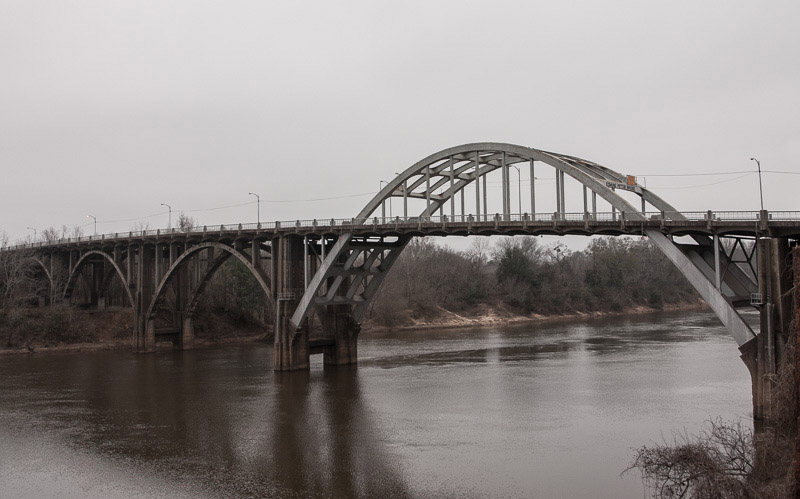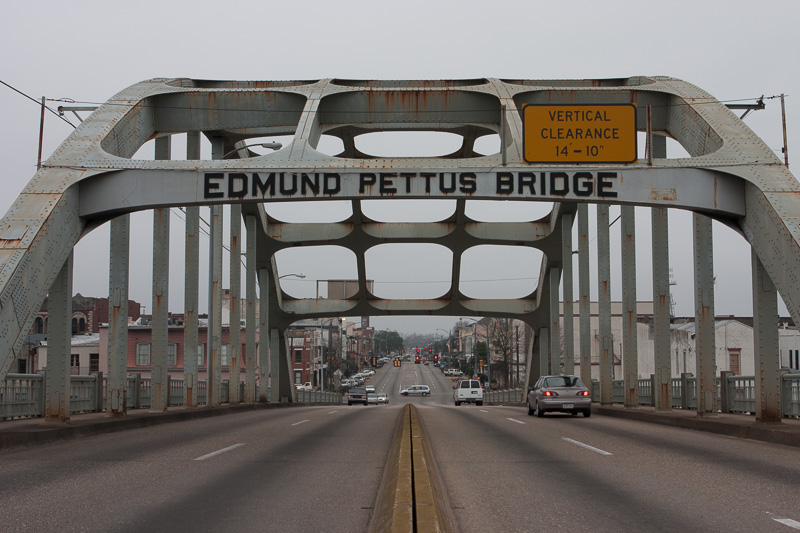

As a student of Infrastructure, I take a lot of pictures of bridges. The one shown above has some lovely parabolic arches, but that’s not what led me to make this photograph 10 years ago. This is the Edmund Pettus Bridge, which carries the Jefferson Davis Highway across the Alabama River just outside of Selma, Alabama. The bridge was the site of a harrowing episode in American history 52 years ago.

On March 7, 1965, some 600 people marched out of Selma and over the bridge, intent on walking all the way to Montgomery, the state capital, 60 miles away. They were marching to demand voting rights for black Americans, and also to protest the shooting death of Jimmie Lee Jackson during a voter registration rally three weeks earlier. On the far side of the bridge, state police and a posse of white citizens blocked the road. When the protesters crossed the county line, the police attacked with truncheons and teargas. Bloody Sunday.
I was 15 at the time, safe at home hundreds of miles away, watching the newsreel footage with an intense feeling of shame and embarrassment. I couldn’t look at my mother, who was sitting next to me. She couldn’t look at me.
A week later, Lyndon Johnson summoned Congress to assemble in joint session, and he read them the riot act. I want to quote some of his words.
I speak tonight for the dignity of man and the destiny of democracy.
I urge every member of both parties, Americans of all religions and of all colors, from every section of this country, to join me in that cause.
At times history and fate meet at a single time in a single place to shape a turning point in man’s unending search for freedom. So it was at Lexington and Concord. So it was a century ago at Appomattox. So it was last week in Selma, Alabama.
There, long-suffering men and women peacefully protested the denial of their rights as Americans. Many were brutally assaulted. One good man, a man of God, was killed.
There is no cause for pride in what has happened in Selma. There is no cause for self-satisfaction in the long denial of equal rights of millions of Americans. But there is cause for hope and for faith in our democracy in what is happening here tonight.
For the cries of pain and the hymns and protests of oppressed people have summoned into convocation all the majesty of this great Government—the Government of the greatest Nation on earth.
Our mission is at once the oldest and the most basic of this country: to right wrong, to do justice, to serve man.
In our time we have come to live with moments of great crisis. Our lives have been marked with debate about great issues; issues of war and peace, issues of prosperity and depression. But rarely in any time does an issue lay bare the secret heart of America itself. Rarely are we met with a challenge, not to our growth or abundance, our welfare or our security, but rather to the values and the purposes and the meaning of our beloved Nation.
The issue of equal rights for American Negroes is such an issue. And should we defeat every enemy, should we double our wealth and conquer the stars, and still be unequal to this issue, then we will have failed as a people and as a nation.
For with a country as with a person, “What is a man profited, if he shall gain the whole world, and lose his own soul?”
There is no Negro problem. There is no Southern problem. There is no Northern problem. There is only an American problem. And we are met here tonight as Americans—not as Democrats or Republicans—we are met here as Americans to solve that problem.
This was the first nation in the history of the world to be founded with a purpose. The great phrases of that purpose still sound in every American heart, North and South: “All men are created equal”—“government by consent of the governed”—“give me liberty or give me death.” Well, those are not just clever words, or those are not just empty theories. In their name Americans have fought and died for two centuries, and tonight around the world they stand there as guardians of our liberty, risking their lives.
Those words are a promise to every citizen that he shall share in the dignity of man. This dignity cannot be found in a man's possessions; it cannot be found in his power, or in his position. It really rests on his right to be treated as a man equal in opportunity to all others. It says that he shall share in freedom, he shall choose his leaders, educate his children, and provide for his family according to his ability and his merits as a human being.
To apply any other test—to deny a man his hopes because of his color or race, his religion or the place of his birth—is not only to do injustice, it is to deny America and to dishonor the dead who gave their lives for American freedom.
Johnson was not my favorite American president. He was vain, uncouth, and too much concerned with his own image and popularity—like another president one could name. Johnson’s support for the civil rights movement was erratic and probably begrudging. Still, on that night 52 years ago he laid out on the public record some ideals and principles that no other president before or since has been brave enough to fully embrace. “The issue of equal rights for American Negroes is such an issue. And should we defeat every enemy, should we double our wealth and conquer the stars, and still be unequal to this issue, then we will have failed as a people and as a nation.”
I teared up at several points in LBJ’s address—again ashamed and embarrassed, afraid to look at my mother. But I was also inspired. Yes! This can happen. And it seemed to be my generation’s special opportunity and responsibility to make it happen.
So. Here we are five decades later. The aims Johnson set forth are still aspirations, not accomplishments. Indeed, we have been backpedaling at a furious pace. American democracy is teetering on the precipice. The law that Johnson proposed that night—the Voting Rights Act of 1965—was duly passed and signed, but it has since been diluted and undermined, first in subtle ways and now in blatant ones. I’m still ashamed and embarrassed when I watch the nightly news. Depressed, too. But, damn it, there’s no giving up. You gotta believe. As LBJ said twice that night, we shall overcome.